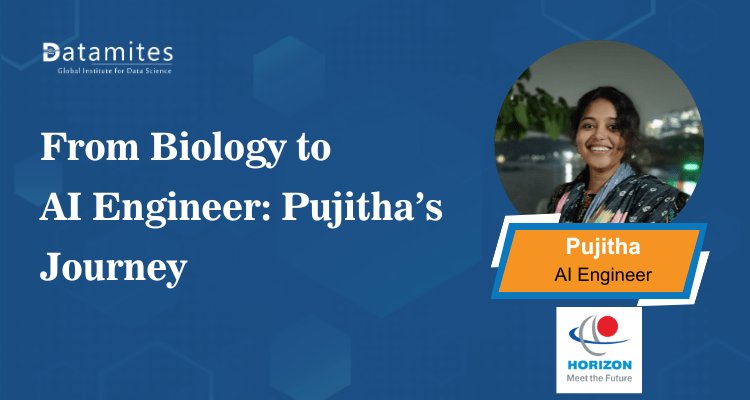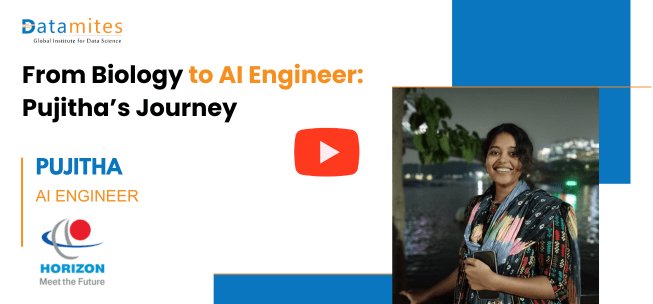From Biology to AI Engineer – Success Story of Kotha Raga Pujitha
Kotha Raga Pujitha’s inspiring journey from a biology graduate to an AI Engineer highlights the power of determination and continuous learning. Despite coming from a non-technical background, her passion for technology and consistent efforts led her to successfully transition into the field of artificial intelligence.

What happens when a biology graduate dares to step into the world of artificial intelligence? For Kotha Raga Pujitha, it meant rewriting her career story with passion, persistence, and a clear goal. In just a few months, she transformed from a life sciences student into a confident AI Engineer cracking interviews, mastering deep learning, and proving that your academic background doesn’t define your future in tech.
Q&A with Poojitha Inspirational Journey from Biology to AI
In this inspiring Q&A session, she shares practical tips, motivational insights, and answers to common questions from fellow learners.
Q1: Can you tell us a bit about yourself, Pujita?
Sure! I’m Kotha Raga Pujitha from Andhra Pradesh. I recently graduated in Biology from Acharya Nagarjuna University. During my final year, I realized that I didn’t want to pursue a career in biology. So, I decided to shift my focus towards the software field.
Q2: What made you choose AI as your career path?
Initially, I wanted to learn a programming language. After speaking with friends and cousins in the tech industry, they suggested Python as it's beginner-friendly. As I explored more, I discovered Data Science, which intrigued me. Eventually, I found out that most data science is based on Python, which matched my interest and existing knowledge.
Q3: Was it difficult to make the switch from Biology to AI?
Yes, initially it was challenging. My friends and family were skeptical since I didn’t have a tech background. Many people told me it would be very tough, especially coming from biology. But I was determined. When I contacted DataMites, I asked the relationship manager many questions to be sure if I could do it. Eventually, I took the leap and never looked back.
Q4: What course did you join at DataMites and when?
I joined the Certified Data Scientist (CDS) course at DataMites in July 2023, in their Hyderabad branch. The CDS course focuses heavily on AI and Machine Learning, which helped build a strong foundation.
Q5: What learning resources did you use apart from DataMites material?
I used a combination of DataMites materials, a few textbooks, Google blogs, and YouTube channels for deeper understanding. These resources helped me grasp tough concepts and stay updated.
Q6: How was your internship experience at DataMites?
Being part of the offline batch in Hyderabad made collaboration easy. We worked in teams at the DataMites center, which allowed us to test different ideas and approaches. Mentor interaction was also easy and frequent, which helped us solve doubts effectively.
Q7: What was your job-ready score and how did it impact your placement?
I scored a 5.9 in the Job Ready Assessment (the threshold is usually 6). This score was an aggregation of mock interviews, tests, and technical evaluations. Though slightly below the benchmark, the real differentiator was consistent practice and project work.
Q8: How many interviews did you attend before landing the job?
I attended just two interviews. The first one involved a written test, which I couldn’t clear. The second one, which came through DataMites, had three rounds in a single day and I cleared all of them and secured the job.
Q9: What types of questions were asked in your interview?
Round 1: A technical test with Python and dataset preprocessing tasks.
Round 2: Real-world scenario-based problem solving.
Round 3: Project explanation and deep questions on CNN (Convolutional Neural Networks), especially focused on image processing.
Q10: What kind of project did you complete during your data science course?
I worked on a handwritten digit recognition project. While it's considered a standard project in deep learning, it taught me a lot about structuring and understanding complex models. Once you grasp the fundamentals with such projects, it becomes easier to tackle more complex ones.
Q11: Is having a gap year a problem during placements?
Not necessarily. Many of my friends with gap years still got placed. Recruiters mainly focus on your knowledge and how well you can explain your experience. If the gap is due to learning, exams, or personal reasons like maternity, it’s acceptable. Just be honest and show how you've used the time productively. If you're currently doing an internship, mention it—it helps position your gap as a transition, not a break.
Q12: Did you complete any projects in NLP or Computer Vision?
I completed extensive projects in both NLP and Computer Vision. Before one of my interviews, I focused heavily on an NLP project and managed to learn key concepts in just one week. Though I didn’t take a separate course, the hands-on project helped me understand NLP well.
Q13: What course did you pursue and what role did you get placed in?
I completed the Certified Data Scientist (CDS) program and secured a role as an AI Engineer. Although the course is called data science, around 70% of the content is AI-related, making it sufficient to apply for AI Engineer roles.
Q14: How did project experience help in interviews?
The project phase helped me understand topics deeply. When faced with practical questions in the interview, I could draw from my project work to explain concepts clearly and confidently.
Q15: Did you work on projects as part of the course?
Yes, we worked in groups of four. It helped me gain real-time experience in applying AI and ML concepts. Projects were demanding and required coordination, but they prepared me well for real-world scenarios and interviews.
Q16: Any tips for non-technical students aspiring to enter AI?
Don’t be afraid. It might seem tough in the beginning, especially with no programming background, but consistency and curiosity can take you a long way. Focus on learning every day, revise regularly, and never hesitate to explore additional resources.
Refer these below articles:
- Anuj’s Journey from Chemical Engineering to AI/ML Engineer
- Arunadevi’s Path from Math Graduate to AI Engineer
- From Non-Tech to Tech: Sowmiya’s Path to AI-ML Engineer
Key Findings from Kotha Raga Pujitha AI Journey
The key findings from her journey highlight the tools, techniques, and mindset shifts that empowered her to make this inspiring leap.
- Background Switch Is Possible: Pujita transitioned from a biology background to an AI engineering role, showing that non-tech graduates can successfully shift into data science and AI with the right mindset and effort.
- Handwritten Recognition Was Her First Project: She began with a standard deep learning project handwritten digit recognition which helped her understand the structure and workflow of AI projects.
- Practice & Consistency Matter: She emphasized daily practice in Python and SQL, using platforms like GeeksforGeeks and Google searches to master the basics and build problem-solving skills.
- Internship Experience Covers Career Gaps: Gaps in education or career are not a major issue if you explain them well and back it up with hands-on internship or project work.
- Rapid Growth is Possible with the Right Focus: Pujita cracked a job offer just one month after completing her course proving that dedication, structured learning, and smart preparation yield fast results.
Read these below articles:
- Is the demand for Artificial Intelligence growing in Trivandrum?
- The Rise of Artificial Intelligence Demand in Surat
- The Growing Demand for Artificial Intelligence in Lucknow
Pujita’s journey from biology graduate to AI Engineer at Horizon shows that with dedication, curiosity, and effort, anything is possible. Her story proves that your background doesn't limit your future, it's your drive to learn and grow that truly matters.
Artificial Intelligence is the simulation of human intelligence by machines, enabling them to learn, reason, and self-correct. In essence, AI allows machines to perform tasks that usually require human intelligence. According to Grand View Research, the global AI market is expected to reach USD 1,811.75 billion by 2030, growing at a CAGR of 35.9% from 2025.
Hyderabad, known as one of India’s major technology hubs, has rapidly emerged as a center for innovation, IT services, and startup culture. With the growing adoption of AI across industries such as healthcare, finance, retail, and telecommunications, the demand for skilled AI professionals in Hyderabad is on the rise. Enrolling in an Artificial Intelligence Institute in Hyderabad equips learners with the latest tools, techniques, and practical knowledge needed to thrive in this high-growth sector.
DataMites is a premier global training institute that specializes in Data Science, Artificial Intelligence, Machine Learning, Python programming, and other emerging technologies. With a strong focus on industry-relevant skills, DataMites provides comprehensive training programs designed to empower individuals and professionals to excel in the rapidly evolving fields of data science and Artificial Intelligence.
DataMites provides a comprehensive Artificial Intelligence course in Hyderabad, aimed at equipping learners with the essential skills and expertise to thrive in the fast-growing AI industry. The program is offered in various formats, including classroom training in Madhapur, as well as online and blended learning options for added flexibility. Participants benefit from a globally recognized certification accredited by IABAC and NASSCOM FutureSkills, significantly boosting their career opportunities in AI-focused domains.

